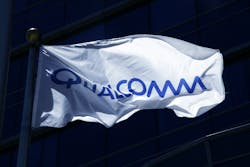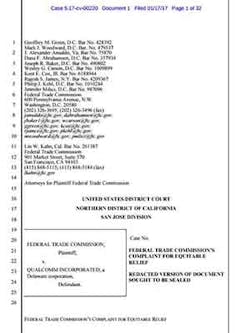Qualcomm has faced allegations in South Korea, Taiwan, China, and Europe that its business of licensing wireless patents violates antitrust laws. But the San Diego firm, the biggest maker of chips for mobile phones, has been relatively safe on its home soil.
That changed on Tuesday when United States regulators filed a complaint against Qualcomm in federal court. In the filing, the Federal Trade Commission said the company had weakened the ability of competitors to sell modem chips, refusing to sell them patent rights and squeezing unfair licensing terms out of phone makers.
The agency said that Qualcomm, which will fight the decision in court, gave kickbacks to smartphone makers using its patent portfolio exclusively. The company also allegedly refused to sell chips to phone makers that didn’t agree to also pay for the underlying blueprints.
The accusations are the latest challenge to the company’s patent licensing business, which accounts for around a third of its revenue. Qualcomm sells smartphone makers access to its patents, which contain industry standards for 3G and 4G cellular communications. But the way it goes about negotiating deals has come under scrutiny around the globe.
The details of the lawsuit are almost identical to a report released by South Korea’s top regulator last month. The Korea Fair Trade Commission hit the company with an $853 million fine, building on the regulator's 2012 allegation that Qualcomm offered rebates to phone makers who agreed to only buy its products. The earlier case is under appeal with the Korean Supreme Court.
An investigation in Taiwan is looking at the same tactics.
Qualcomm has denied any wrongdoing. The company typically does not license its standardized technology to rivals, citing a decades-old practice in the chip industry. Multiple regulators have called it a double standard, though, since Qualcomm sells the same patent access to manufacturers like Apple and Samsung. It is only recently that regulators have questioned that model, Qualcomm said.
"The FTC does not have the authority to rewrite industry policy," said Don Rosenberg, Qualcomm's executive vice president and general counsel, in a Tuesday statement. "That is for the industry, not a regulator, to decide.”
"Qualcomm believes the complaint is based on a flawed legal theory, a lack of economic support and significant misconceptions about the mobile technology industry," the company added in a statement, which also said the company helped consumers by investing its licensing profits for research.
Qualcomm not only doles out intellectual property for wireless components, but it also separately makes chips. And sometimes it both licenses patents and sells hardware to the same companies. In late 2015, the company rejected calls to split its licensing and chip-making business into two parts as a way to boost sales.
But it appears that the cozy relationship between the two businesses has caught the eye of regulators. According to the lawsuit, Qualcomm holds its chip supply hostage to obtain licensing terms that smartphone makers would otherwise reject.
“These royalties amount to a tax on the manufacturers’ use of baseband processors manufactured by Qualcomm’s competitors, a tax that excludes these competitors and harms competition,” the FTC said in a statement.
The FTC also said that Qualcomm paid Apple billions of dollars in rebates over the last five years so that the smartphone maker would use its chips exclusively. The agency said that Qualcomm did so to prevent other companies from getting Apple's business and become stronger competitors. The kickbacks lasted from 2011 to 2016, the agency said.
Officials asked the District Court for the Northern District of California in San Jose to order the company to stop such dealings. Qualcomm plans to appeal the decision, which could have consequences on how it does business with phone makers. But the lawsuit could take years to play out.
Last month, the South Korean regulators ordered Qualcomm to negotiate new contracts with customers like Samsung and LG based in South Korea. But more importantly, the regulator also ordered Qualcomm to start licensing patents to rival chip makers, like Intel, which would be a fundamental change in its royalty model.
Qualcomm's Rosenberg thinks the U.S. lawsuit stands on shaky ground. He drew attention to the fact that only three of the normal five FTC commissioners were available to vote on the complaint. Democratic chairwoman Edith Ramirez and Democrat Terrell McSweeny both approved what is likely the agency’s last complaint before President-elect Donald Trump is inaugurated on Friday.
Ramirez will not be around to follow through on the Qualcomm lawsuit. She is stepping down from the agency on February 10th, and her replacement is likely to be Republican commissioner Maureen Ohlhausen, who was the only one to vote against filing the complaint against Qualcomm.
The regulators have had Qualcomm under the microscope since 2014. Steven Mollenkopf, Qualcomm’s chief executive, revealed that November that the FTC had been investigating the chip maker for not licensing its patents in a “fair, reasonable, and nondiscriminatory” way. Qualcomm has been criticized for charging too much for its patent portfolio, parts of which some device makers don’t even use.
Questions about Qualcomm’s licensing business have spurred multiple lawsuits. It has allegedly stepped on toes in Europe, where competition commissioner Margarethe Vestager accused Qualcomm of giving significant rebates to extract exclusivity from a smartphone and tablet maker. In 2015, China’s top antitrust regulator forced the company to pay $975 million in fines and take a smaller cut of devices sold using its patents.
About the Author
James Morra
Senior Editor
James Morra is the senior editor for Electronic Design, covering the semiconductor industry and new technology trends, with a focus on power electronics and power management. He also reports on the business behind electrical engineering, including the electronics supply chain. He joined Electronic Design in 2015 and is based in Chicago, Illinois.




